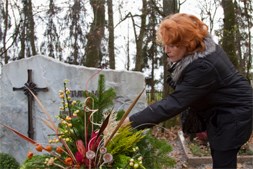A Master Class in Grief

Losing our parents is an inevitability. If it hasn't happened to you already, it will. It's how life works.
Perhaps I should reframe that. We don't "lose" them; they pass away, depart this life, go on ahead, are called home, are promoted to Glory, are no longer with us. Oh, so many ways of not saying it. They die.
At least, their physical bodies cease functioning and life continues in a dimension we're unable to access. Our complex history of connection is punctuated by death's rude interruption.
After the sudden death of my father, my mother collapsed, lost consciousness, and a week later died. Any other woman would have shirked the effort it took to stay alive in that last week. Not she. She was an Island woman who had weathered many a wild winter storm. Constancy and perseverance were her watchwords even to death.
In the vigil, the color contrast on reality was hiked all the way up, the saturation levels of faith came into sharp focus, and we become aware of each pixilated minute. A stray hair, a scuff on a bedside shoe, a snaggy fingernail that would never need to be trimmed.
Into this sacred space, others ventured. Some tenderly. Some ignorantly. We're all encompassed at life's end by the living. Family, friends, pastors, strangers. Each embossed with experiences that determine how they walk alongside, how they touch those of us holding death's hand.
As my mother died, those who encircled all meant well. Each made effort to accompany our grieving. I documented the interactions in order to hold the learning. I wrote knowing that I soon would be them, standing by a friend or stranger as they had their close-up with death. I wanted to make sure what I said, how I was, what I did would be helpful, useful, good, that I wouldn't add injury to those already bruised and insulted by death's thievery.
There was much to learn from them. Practical things, personal things, important things. The most impactful, though, was a surprise.
It makes absolute sense that when confronted by the discomfort of another's death, the experience inevitably drops a large bucket into the reservoir of our own painful memories. Such remembrance can illicit the "Gosh! Your mother's [crackly/stilted] breathing is exactly what my grandmother/uncle/best friend did…It was awful/weird/just minutes before they died…of complicated pneumonia/liver cancer/brain trauma…last June/in 1965/about four years ago last winter…or was it summer, I can't quite remember."
Not helpful. At all.
Why? Because the grievers' plates are full. There is no room for another's past grief. In the expression of grief there are always senders and receivers. The job of receiving is being fully with the grievers in their sorrow. There isn't space at a deathbed to mourn those out of reach. To put it crudely, the freshest grief trumps all others. This is their time to mourn. Please, for the love of God, let's not interrupt the newly dead and dying with our own stories. Not yet. Important and life shaping though our experience is, there will be ample time later to discuss the echoes, but not while the dead lie still unburied.
The other invaluable lessons learned at my mother's deathbed can be found by downloading How to Help a Family in Grief. The wisdom of the house of mourning serves me well. I'm praying it does the same for you and those you love and serve.
Christine Jensen is a wife of one, mother of two, sporadic writer, and wholehearted pastoral worker based in Cornwall, England. Originally an occupational therapist, she subsequently graduated from Talbot School of Theology, California, with an MA in Christian Ministry and Leadership. Having served in the local church for the last 20 years, she works to see real relationships flourish and loves to see freedom break out through the transforming power of God's love.












